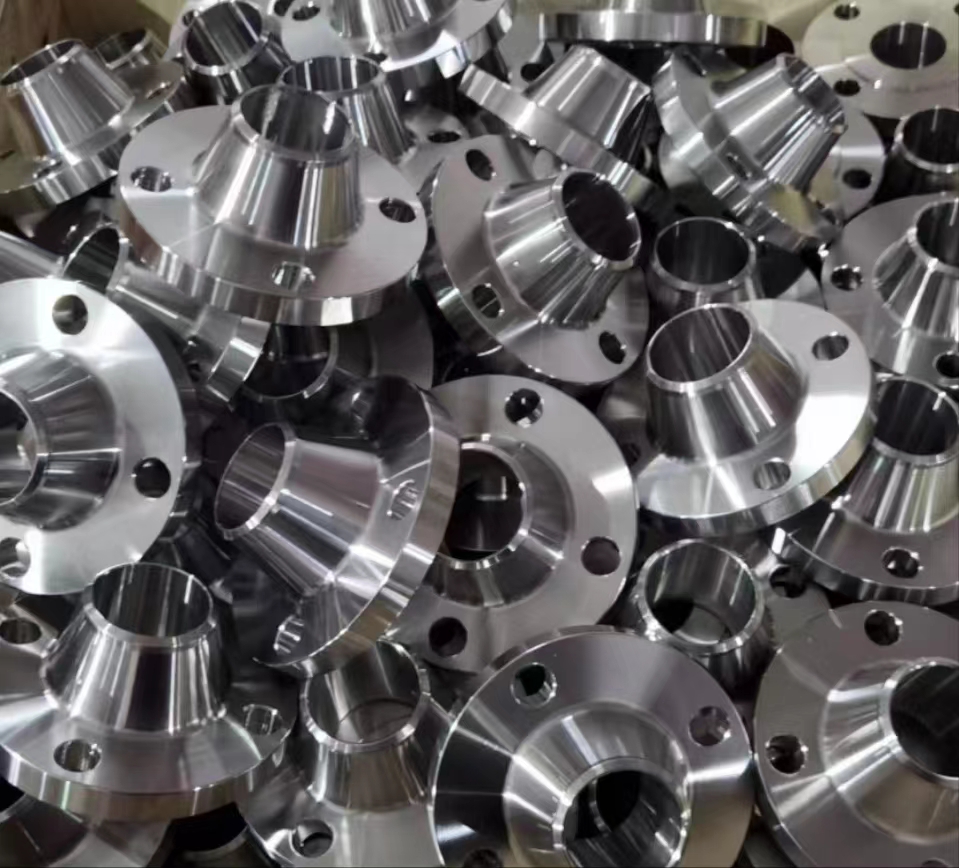In modern industry, stainless steel flanges are widely used in piping systems to provide connections, seals, and reinforcement. As a critical component, stainless steel flanges are capable of withstanding extreme working conditions while offering significant advantages such as corrosion resistance and high-pressure endurance. Whether in chemical, oil, gas, or food processing industries, stainless steel flanges play a crucial role in ensuring the stability and safety of piping systems.
What is a Stainless Steel Flange?
A stainless steel flange is a metal ring component used to connect pipes, pumps, valves, and other equipment. It is secured by bolts, forming a tight, sealed connection between two pipes or pieces of equipment. Typically made from stainless steel, flanges are highly valued for their excellent corrosion resistance, high-temperature tolerance, and mechanical performance, making them suitable for a wide range of industrial applications.
Types of Stainless Steel Flanges
Stainless steel flanges come in various types, each designed for specific applications and offering unique benefits. Common types of stainless steel flanges include:
-
Slip-On Flange: This flange is slid over the pipe and welded into place. It is commonly used in low-pressure systems and is easy to install.
-
Weld Neck Flange: Typically used in high-pressure, high-temperature pipeline systems, this flange provides higher strength and resistance to impact.
-
Blind Flange: Used to seal the ends of pipes, blind flanges are often employed in temporary or permanent pipeline closures.
-
Threaded Flange: Threaded flanges connect to pipes via threads rather than welding, making them ideal for systems that don’t allow welding.
-
Raised Face Flange: With a raised contact surface, this flange improves sealing performance, making it ideal for applications requiring tight seals.
Advantages of Stainless Steel Flanges
-
Corrosion Resistance: One of the key advantages of stainless steel flanges is their exceptional resistance to corrosion. Even in environments with corrosive chemicals, they maintain stable performance and extended service life.
-
High-Temperature Tolerance: Stainless steel flanges are capable of operating at high temperatures, making them suitable for applications in high-temperature pipeline systems.
-
Strength and Toughness: The material provides flanges with high strength and toughness, able to withstand high pressures and impacts, ensuring the stability of the system.
-
Versatility and Adaptability: With a wide range of flange types and sizes, stainless steel flanges can be tailored to meet specific requirements. Whether for small pipelines or large-diameter systems, there is a flange suitable for every need.
-
Durability: Compared to other metals, stainless steel flanges offer a longer service life, reducing the need for frequent replacements and maintenance costs.
How to Choose the Right Stainless Steel Flange
When selecting the right stainless steel flange, consider the following key factors:
-
Application Environment: Choose a flange based on the system’s pressure, temperature, and exposure to corrosive substances.
-
Size and Specifications: Flanges must match the size and type of the pipeline. Be sure to select the correct dimensions and specifications for your needs.
-
Connection Method: Select a flange type based on how the pipes will be connected, such as welded or threaded connections.
-
Material: While stainless steel is the most commonly used material, other alloys can be chosen based on the operating environment.
-
Standards and Certifications: Ensure that the chosen flanges meet industry standards and certifications, such as ANSI, ASME, or DIN.
Applications of Stainless Steel Flanges
-
Chemical Industry: Stainless steel flanges are commonly used in chemical pipelines, preventing harmful chemical leaks while ensuring safe operation in high-pressure, high-temperature environments.
-
Oil and Gas: In the oil and gas industry, stainless steel flanges are used to connect high-pressure pipelines, ensuring system integrity and safety.
-
Food Processing: Stainless steel flanges are ideal for the food processing industry due to their corrosion resistance and easy-to-clean properties, meeting stringent hygiene standards.
-
Water Treatment and Environmental Protection: Stainless steel flanges play an important role in water treatment systems, ensuring the durability and sealing of water pipelines.
-
Pharmaceutical Industry: In the pharmaceutical sector, stainless steel flanges are chosen for their corrosion resistance and high-temperature resistance, ideal for maintaining hygiene standards.
Conclusion
Stainless steel flanges have become indispensable components in industrial piping systems due to their corrosion resistance, high-temperature tolerance, and strength. From slip-on flanges to threaded flanges, various types of stainless steel flanges can meet the needs of different industrial sectors. When selecting the right flange, it’s essential to consider the application environment, pressure requirements, temperature conditions, and industry standards to ensure the system’s long-term stability.
If you’re looking for high-quality stainless steel flanges, Yunming Metal offers a wide range of flanges, including weld neck flanges, threaded flanges, blind flanges, and more. We provide customized services to meet the specific needs of your project, ensuring compliance with industry standards. Contact us today to learn more about our stainless steel flange specifications, sizes, and custom solutions for your project.

